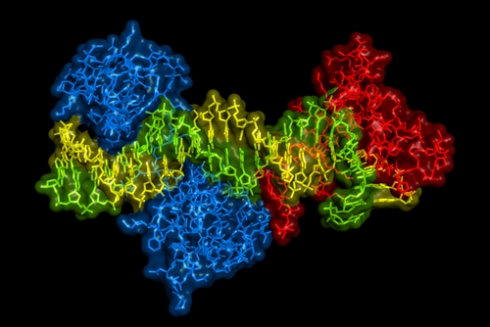Spotlight on: Proteomics

The Biologist Vol 61(5) p30-31
Proteomics is the large-scale study of proteins. The term was coined in the 1990s to make an analogy with genomics, the study of genomes. The entire set of proteins that are made by an organism or cell type is known as its 'proteome' and proteomics attempts to catalogue and understand these enormously complex sets of molecules.
The field combines skills and techniques from chemistry –such as mass spectrometry and electrophoresis – with specialised mathematical modelling and computing known as bioinformatics.
Why is proteomics important?
Proteins are essential components of life, performing a vast array of functions and forming many of the structures found in living tissue. Now that the genomes of many organisms have been mapped, to truly understand biological systems, we need to understand the role of all the proteins produced in each cell. Genes are merely the 'recipe' for creating a bewildering array of functional proteins, and so proteomics arguably holds even more promise than huge genomics programmes such as the Human Genome Project.
How come I've never heard of it?
Studying proteins has always been an essential part of many fields, such as cell biology, molecular biology, developmental biology, medicine and biochemistry, but the large-scale study of proteins was not possible until the arrival of high-throughput screening and computing technologies. Proteomics labs tend to develop specialist tools to support researchers in other fields who work with these complicated molecules.
What careers are available?
Clinical proteomics is a growing field that studies the protein 'biomarkers' that help predict or diagnose disease. Many people with expertise in proteomics are employed in the healthcare and pharmaceutical industries to identify and assess these biomarkers to help develop diagnostics and treatments. Candidates need a good understanding of protein purification and analysis, requiring a PhD in biochemistry or a related field of biology, as well as industrial experience.
Biotech companies and university facilities provide specialist protein analysis services to other researchers or labs. Any proteomics research also requires experts in maths, computing and database design to process the data generated by protein analysis.
Where can I get more information?
Large projects such as the Protein Data Bank and UniProt are comprehensive and free resources containing information on the structure and function of hundreds of thousands of proteins and nucleic acids.
The British Society for Proteome Research is a small charity that lists proteomics events and courses, while the British Mass Spectrometry Society has a protein analysis special interest group and forums on the topic. There are many other similar societies around the world.
At a glance
 Name: Dr Bill Mullen
Name: Dr Bill Mullen
Profession: Director of biomarker research, Institute of Cardiovascular & Medical Sciences, University of Glasgow
Qualifications: MSc on phenolics in raspberries, PhD on flavonol metabolites, both from University of Glasgow
Interests: Mass spectrometry, proteomic and metabolite analysis, health and nutrition.
What do you and your research group do?
We work closely with clinicians to try to identify biomarkers of disease and find ones that are more specific and sensitive than existing ones. A lot of the work focuses on cardiovascular disease and obesity, and the resulting chronic kidney diseases.
How do you create an accurate 'fingerprint' of a disease?
We compare the proteome of people with these diseases and people presenting with similar symptoms. Comparing patients with healthy people is not particularly useful, as the proteins present are so different.
Lots of your analyses are of the proteins and peptides in urine. Why?
Everyone in this field started by looking at blood, but it was too complex. The concentration range of proteins is so large no machine could cope; it is like having a ruler that can measure both a human hair and Mount Everest at the same time. Also blood is changing, even after collection. Urine has a lower concentration range and there is no protease activity, so it doesn't change after sample collection.
What does your average day involve?
It's very much lab-based, but we have clinicians working within the institute and in the hospital next door. We are running mass spectrometers pretty much all the time.
Could you do what you do without today's cutting edge, high-throughput equipment?
No. Comparing 100 samples versus another 100 using the old analysis tools like 2D gels would be a lifetime's work. If it wasn't for the quantum leap we've seen in mass spectrometry, we wouldn't have proteomics.
How did you get into proteomics?
I think one of the joys of being a scientist is working with machines and measuring things. I started my own company designing machines to help measure metabolites. I started looking at proteomics for biomarkers of health in nutrition. At present there is no way of measuring improvements in cardiovascular health from eating more fruit and vegetables.
Do you think anyone thinking of a career in proteomics should have a passion for tools such as mass spectrometry then?
Yes, I've always worked with it and that is the field, basically. If you're going to get into science, it must be your hobby as well as your work. I'm still tweaking my machines and working on a new interface between devices that has taken us beyond what other analysis can do.
Aside from the kit, what do you like about proteomics?
The proteome is just such a massive area still to explore. Unravelling organisms' genomes was just the beginning. It's like that saying – every time you learn something, you find out two more things you don't understand.
What excites you about the future?
We currently pick up 'fingerprints' of disease by cataloguing the mass and migration of peptides present, but we don't really know what they are or what they do. Once we understand why these proteins have changed, we start to connect our discipline with the actual physiology of the disease. In the future I think you'll be able to take a urine sample, screen it for a multitude of diseases and come up with a health report with a range of recommended treatment options.


